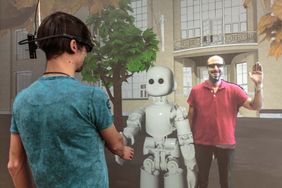
»Human Brain Project«: computer scientists at Bauhaus-Universität Weimar participate in major project to study human brain
The »Human Brain Project«, which has been funded by the EU since 2013, links brain research with computer science to investigate the functions and workings of the human brain. Within the »Neurorobotics« subproject, brain models simulated on the computer control real robots to make their learning capabilities and flexibility even more realistic. The Professorship for Virtual Reality Systems at the Bauhaus-Universität Weimar has been involved in the project since April 2018. The scientists in Weimar are helping the robots to interact with one other and with humans in virtual reality.
The »Human Brain Project« is an interdisciplinary research project in which scientists from the fields of neuroscience, medicine, physics and computer science work together to simulate the human brain on the computer. The findings are to be used in medicine and computer science – to facilitate the diagnosis and treatment of diseases, for example. More than 100 cooperation partners from 24 countries are involved in this major project. Scientists from the Bauhaus-Universität Weimar have also contributed their expertise to the research project since April of this year. The »Neurorobotics« subproject in which virtual brain models are connected to their »own« simulated or real robot body will investigate how the brains that have been developed react to and process external stimuli. The findings will also help to develop robot controls inspired by the human brain.
As an active partner, the Professorship of Virtual Reality Systems in Weimar will enable control of the robots by the brains to first be observed and tested by several people in a virtual environment. Prof. Dr. Bernd Fröhlich and his team link the »Neurorobotics Platform« (NRP) development environment, created specifically for this purpose, will use their software and hardware infrastructure in the Digital Bauhaus Lab to enable a natural and realistic interaction between simulated robots and people in virtual reality. This direct interaction puts high demands on the real-time capability of the algorithms to develop – for precise reconstruction of the avatars and their interaction with virtual robots, for example. The primary goal is to test innovative new robot controllers for complex situations in virtual environments without having to build expensive robot models or put any humans at risk.
The Bauhaus-Universität Weimar is taking on a decisive role in the ten-year project in which around 500 scientists at 100 different universities, teaching hospitals and research centres (including 21 German research institutions) have been involved since 2013.
About the »Human Brain Project«
The »Human Brain Project« is a flagship research project that has been funded by the European Commission with 1.19 billion euros since 2013. Under the leadership of Phillipe Gillet, a professor at the École Polytechnique Fédérale de Lausanne (EPFL), 13 project groups will develop supercomputer-based models and simulations of the human brain by 2023. The aim of the project is to better understand the basic mechanisms of the brain in order to be able to draw conclusions about neurological and mental illnesses.
For more information on the project, please visit www.humanbrainproject.eu/en.
For questions regarding participation in the research project at the Bauhaus-Universität Weimar, please contact Prof. Dr. Bernd Fröhlich:
Bauhaus-Universität Weimar
Faculty of Media
Professorship for Virtual Reality Systems
Phone: +49 (0) 36 43/58 37 32
E-Mail: bernd.froehlich[at]uni-weimar.de
Kontakt
Bauhaus-Universität Weimar
Claudia Weinreich
Pressesprecherin
Tel.: +49(0)3643/58 11 73
Luise Ziegler
Mitarbeiterin Medienarbeit
Tel.: +49(0)3643/58 11 80
Fax: +49(0)3643/58 11 72
E-Mail: presse[at]uni-weimar.de
Web: www.uni-weimar.de/medienservice
